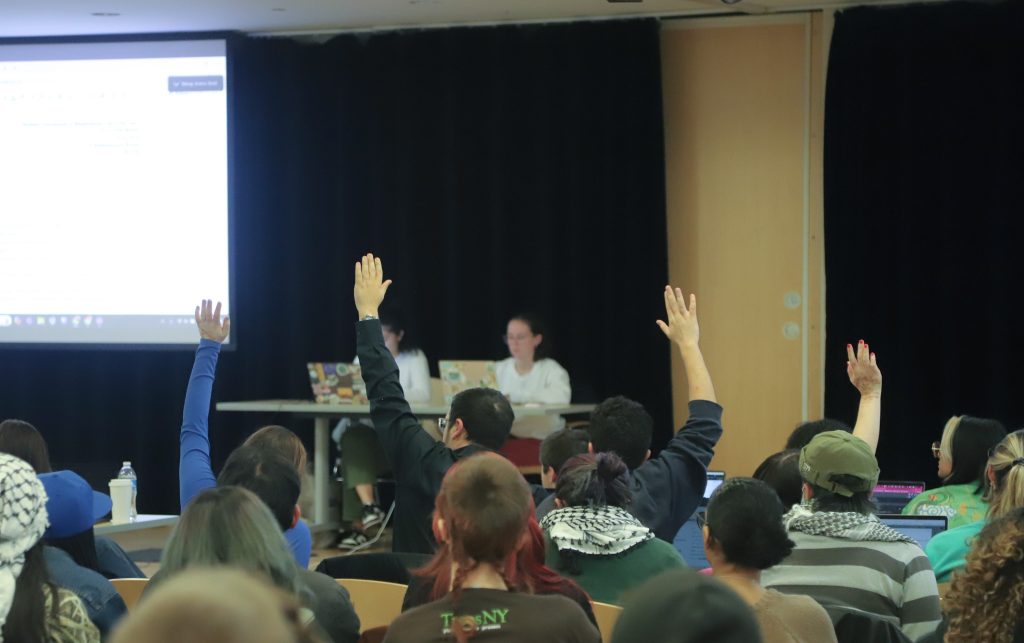The Student Association Congress failed to overturn their E-Board’s veto of a resolution passed last month at a meeting Tuesday night. The resolution explicitly rejected outside organizations Binghamton Solidarity for Palestine and SUNY BDS, prohibiting SA-chartered groups from collaborating with them.
A few days after a jam-packed session on Oct. 8, the E-Board vetoed two of the five passed pieces of legislation. One attempted to ban masks and facial coverings during “lawful and unlawful assemblies or riots.” The other, R6, threatened punishment “up to and including the suspension of SA recognition” if an organization collaborated with one of the aforementioned groups.
At the meeting on Tuesday, Saul Hakim, an off-campus representative and a senior advisor for the BU Zionist Organization double-majoring in Judaic studies and political science, asked that Congress move into executive session to vote on overriding the veto of R6. He requested that the E-Board not be present because of a potential conflict of interest.
He described the high-stakes nature of the decision to attempt to override the veto, acknowledging the E-Board’s influence within the SA.
“The procedural barriers and the high threshold for overturning a veto proved insurmountable, despite the fact that we came quite close,” Hakim wrote to Pipe Dream. “This speaks to how serious and significant this issue is to both the student body and its representatives. Ultimately, however, the executive board failed their student body by issuing the veto and not standing against blatant antisemitism.”
Hakim prepared a report condemning the outside organizations for certain social media posts, which he argued amounted to antisemitic rhetoric, denying the Jewish people their connection to Israel. He denounced flyers shared on social media, including one that compared photos of Gaza to images from the Holocaust.
Kristina Donders, the speaker of Congress, advised the body not to move forward with the executive session, saying it would undermine SA transparency and democratic principles. She reminded the room that minutes from executive sessions are not publicly accessible.
“As Speaker, I’m committed to working with Congress representatives to create an environment where everyone feels safe expressing their opinions openly, while upholding the principles of transparency and accountability,” Donders wrote to Pipe Dream. “Although I don’t believe moving into Executive Session was the best way to conduct this debate, I understand why the representatives did so.”
Hakim said that due to fears about doxxing, he wanted other members of Congress to feel comfortable casting their votes freely. He mentioned how the votes on last year’s BDS resolution were taken down after being public for a few days after the meeting.
After the University received a letter from a state politician calling for representatives to be expelled based on their votes, the votes were redacted, Donders said during the meeting. Students had received death threats that were reported to the University Police Department. After debate, the motion to move into executive session passed.
The E-Board echoed Donders’ concerns, saying the decision to move into executive session “undermined the democratic integrity of Congress.”
“The continuation of such actions would set a dangerous precedent and prevent the representatives from being held accountable by their constituents,” the E-Board wrote to Pipe Dream. “Successful measures have been taken in the past to protect the Congress representatives, and these measures did not include voting on legislation during an executive session. If such a situation presents itself again, the E-Board will not hesitate to take similar actions to protect our members.”
They expressed support for the upholding of their veto, saying R6 overstepped the SA’s checks and balances.
At the time of the SA E-Board’s veto, Binghamton Solidarity for Palestine said they were happy with the decision, arguing that Congress “attempts to silence [their] organization by threatening groups who collaborate with [them],” and emphasizing their continued solidarity with Palestinians.
Turning to old business, a resolution that only chartered student groups could be listed as sponsors on SA legislation, which was tabled at October’s fiery meeting, was passed. A resolved clause that “any non-chartered or unrecognized groups, or external organizations may be listed solely in a footnote labeled Non-SA Chartered Organizational Sponsors,” with a limit of two non-chartered sponsors per piece of legislation was added. The change came after concerns were raised about the resolution barring other potential outside sponsors, like faculty or local nonprofits.
Despite his disappointment with the outcome of the vote to override the veto, Hakim reaffirmed his commitment to combating antisemitism on campus and advocating against the marginalization of students. He also said he was inspired by the unity shown during the meeting, especially as a resolution to enhance kosher and halal dining on campus was introduced.
“This initiative brought together groups from all backgrounds, ethnicities, and cultures to address collective struggles, showcasing the best of what we can achieve as a campus community,” Hakim wrote. “I am committed to working with all stakeholders to make this vision a reality and to continue fostering collaboration among diverse groups on campus.”



